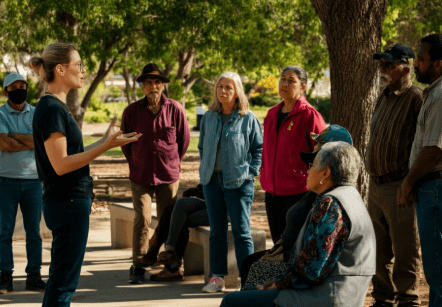How to do a lot split in Florida? To perform a lot split in Florida, one must adhere to local zoning laws, obtain necessary approvals from municipal authorities, and ensure the division meets all legal, spatial, and environmental requirements. Navigating the land development process can be complex, especially when it involves dividing property. “How to Do a Lot Split in Florida” is a procedural affair and a strategic approach to maximizing property potential and value. This blog aims to demystify the essentials and provide a step-by-step guide on “How to Do a Lot Split in Florida.” Whether you’re a seasoned developer or a homeowner looking to make the most out of your land, understanding the legal, logistical, and practical steps involved in subdividing property in the Sunshine State is crucial. Join us as we break ground on this transformative process, ensuring you’re well-prepared to navigate the intricacies of lot splitting in Florida.
Steve Daria and Joleigh, renowned real estate investors with a keen eye for unlocking value in challenging properties, have successfully navigated the intricate world of lot splitting in Florida. Their approach, which balances diligent research with innovative strategies, serves as a guiding light for anyone looking to venture into this lucrative arena. By following their footsteps, developers and homeowners can gain insights into effective ways to maximize their property’s potential.
Understanding Lot Split
Before discussing “How to do a lot split in Florida,” it’s crucial to understand that a lot split is a complex process involving various legal, regulatory, and logistical considerations.
As in many other jurisdictions, lot splits must comply with local zoning ordinances, land development codes, and subdivision regulations in Florida.
These regulations govern minimum lot size, setback requirements, infrastructure standards, and environmental considerations.

Engaging with local planning departments and obtaining the necessary permits and approvals are essential to ensure compliance with these regulations.
The Importance of Lot Split in Florida’s Market
Florida’s real estate market is uniquely positioned for lot splits due to its rapidly growing population, tourist appeal, and diverse landscapes.
From beachfront properties to urban infill lots, executing a lot split in Florida can cater to a broad audience, including residential buyers, commercial developers, and investors seeking to diversify their portfolios.
Get Started: Get Your Cash Offer Below…
We are direct land buyers. There are no commissions or fees and no obligation whatsoever. Start below by sharing where your property is and where we can send your offer…
Step-by-Step Guide on How to Do a Lot Split in Florida
This guide offers a comprehensive overview of each step involved in the lot split process in Florida, designed to simplify and demystify the procedures for property owners.
From initial planning to obtaining final approvals, we’ve covered everything you need to know to divide your property successfully.
Initial Research and Planning
- Understanding Local Regulations: Each municipality in Florida has its zoning laws and requirements for lot splits. Consult the city or county planning department to familiarize yourself with the local regulations.
- Assessing the Lot: Only some parcels are suitable for a split. Consider factors such as size, shape, topography, and existing infrastructure.
- Market Analysis: Research the demand for smaller lots in your area. This will help you gauge the probability of success of your split.
Engage with Professionals
- Surveyor: Hire a licensed land surveyor to create a precise map of the proposed subdivisions. Local authorities will require this critical step.
- Real Estate Attorney: Seek advice from a seasoned real estate attorney experienced in Florida’s property laws to guide you through legal requirements and ensure compliance.
- Engineer/Planner: Depending on the complexity of your lot split, you might need the expertise of an engineer or a planner to address potential issues like access roads, drainage, and utility connections.
Submitting Your Application
- Preparation: Gather all necessary documents, including the survey, legal descriptions of the new lots, and any required application forms.
- Review Process: Submit your application to the local planning department. Be prepared for a review process, which may involve public hearings and adjustments to your plan.
- Fees: Understand and pay any applicable fees for the lot split application. These can change significantly depending on the location and specifics of your project.
Finalizing the Split
- Approval: Once approved, you’ll receive official documents from the local government formalizing the split of the lot.
- Recording: The new lot descriptions and easements must be recorded with the county clerk’s office to make the split legal and binding.
- Development and Sale: With the lot split finalized, you can proceed with development plans, sell the individual lots, or explore other opportunities.
Strategies for a Successful Lot Split
Adopting the right strategies ensures a seamless and legally compliant lot split process in Florida.
This section will explore essential tips and practical steps property owners can follow to navigate this complex procedure with greater ease and certainty.
Community Engagement
It is a crucial aspect of the lot split process in Florida, as it can help address concerns, build support, and foster positive relationships with neighbors and local stakeholders.
Early engagement allows for open dialogue and addressing potential issues or objections before escalating.

By proactively reaching out to neighbors and community members, developers and property owners can demonstrate transparency, listen to concerns, and incorporate feedback into their plans.
This collaborative approach not only helps to mitigate opposition but also fosters a sense of community involvement and ownership in the decision-making process.
Flexibility
It is essential when navigating the lot split process in Florida, as it allows developers and property owners to adapt their plans in response to feedback from the local planning department and community input.
This may involve revising lot configurations, addressing concerns about property access, or modifying to comply with zoning regulations or design guidelines.
Stakeholders can build trust and cooperation with regulatory authorities and community members by demonstrating a willingness to listen and make adjustments.
Additionally, remaining flexible enables developers to navigate unforeseen challenges or circumstances during approval.
Marketing
Developing a solid marketing strategy for newly created lots is crucial to attracting buyers or developers in Florida.
This strategy should emphasize the lots’ unique benefits and potential uses, tailored to the target audience.
Highlighting features such as proximity to amenities, access to transportation, or desirable neighborhood characteristics can enhance the appeal of the lots to potential buyers.
Additionally, showcasing the development potential of the lots, such as opportunities for building custom homes, multi-family dwellings, or commercial properties, can attract developers looking to capitalize on the investment opportunity.
Utilizing a mix of digital marketing, print advertising, and targeted outreach to real estate professionals and potential buyers ensures maximum visibility and engagement with the market.
FAQs About How to Do a Lot Split in Florida
Navigating the process of a lot split in Florida can seem daunting for many property owners.
Below are the most frequently asked questions to help you understand the crucial steps and legal requirements for dividing your property.
How long does the lot split process take in Florida?
The timeline can vary widely depending on local regulations, the complexity of the split, and any issues that arise during the review process.
It can take anywhere from a few months to over a year.
Can I split a lot with an existing structure?
Yes, but the process may be more complex. You’ll need to ensure the split complies with zoning regulations regarding minimum lot sizes and setbacks.
Are there any restrictions on what I can do with the split lots?
Restrictions will depend on local zoning laws and any covenants or easements associated with the property.
Understanding these restrictions is essential before planning your lot split.
Conclusion
Executing a lot split in Florida offers exciting opportunities but requires careful planning, adherence to local regulations, and strategic execution. By following these steps on how to do a lot split in Florida and engaging with the right professionals, you can complete the process and unlock your property’s potential. Whether you’re looking to develop, sell, or lease, a lot split can provide a valuable pathway to achieving your real estate goals in Florida’s vibrant market.
**NOTICE: Please note that the content presented in this post is intended solely for informational and educational purposes. It should not be construed as legal or financial advice or relied upon as a replacement for consultation with a qualified attorney or CPA. For specific guidance on legal or financial matters, readers are encouraged to seek professional assistance from an attorney, CPA, or other appropriate professional regarding the subject matter.
